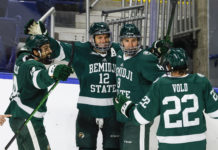LAKE PLACID, N.Y. – Here are three takeaways from Cornell’s 4-1 victory over Union in an ECAC Hockey semifinal Friday night.
1. Cornell inundated the Dutchmen with 21 shots on goal in the first period. While the production evened out through the next two frames with six shots in each, Cornell swarmed the Union half of the net. Even with the Big Red’s output triple that of the Dutchmen, the first period ended scoreless. Union ended the game outshooting Cornell 34 to 33, with nine power-play shots on four opportunities. On the other side of the puck Cornell blocked 18 shots; now a hallmark of their game. Mike Schafer, Cornell coach, pointed to Jake Weider as a team leader in laying down in front of shots.
“He leads our charge on those blocked shots,” Schafer said. “Someone said that he has twice as many (blocks) as the next competitors in our league are concerned. He leads by example; our guys follow.”
2. Union’s Hobey Baker finalists Mike Vecchione and Spencer Foo were largely held off the score sheet and out of play for a large majority of the game. Foo’s assist on Cole Maier’s goal, the only tally for the Dutchmen, was the only impact really felt by the nation’s No. 3 and 4 scorers. The positioning and work by the Cornell defensemen to negate the two as a factor is seen as a key part in transitioning Friday night’s success into a title on Saturday.
“Vecchione, to keep him off the score sheet … they have two really good lines,” Cornell coach Mike Schafer said. “It’s very similar to tomorrow night’s game (against Harvard). You’ve got (Alex) Kerfoot, (Ryan) Donato, (Lewis) Zerter-Gossage, and you have the other line with (Tyler) Moy, they also have two great lines. It’s great preparation going into tomorrow night.”
3. Ivy League fans should rejoice at an all-time classic matchup between the Big Red and Harvard set for Saturday night. The teams have faced off six times in the ECAC Championship, with Cornell leading the all-time record advantage 4-2. The most recent meeting resulted in a Harvard win in 2006. The 2002 and 2003 championships between the two went to overtime, and the first meeting in 1969 ended in a 4-2 Cornell victory.
